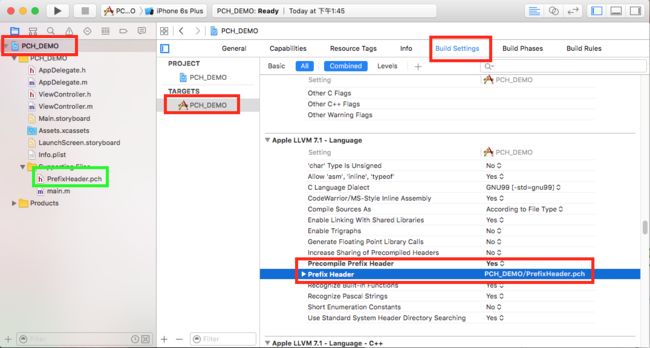PCH: pre-Compile Header(预编译头文件),由编译器在建立工程时自动生成; 其中存放有工程中已经编译的部分代码; 在以后建立工程时不再重新编译这些代码.
- 添加pch文件
2.在pch文件中添加常用的宏定义
(参见:https://github.com/luran2358/LRMacroDefinition)
//
// LRMacroDefinitionHeader.h
// LRMacroDefinition
//
// Created by lu on 16/7/4.
// Copyright © 2016年 scorpio. All rights reserved.
//
#ifndef LRMacroDefinitionHeader_h
#define LRMacroDefinitionHeader_h
//1.获取屏幕宽度与高度
//#define SCREEN_WIDTH [UIScreen mainScreen].bounds.size.width
//#define SCREENH_HEIGHT [UIScreen mainScreen].bounds.size.height
//需要横屏或者竖屏,获取屏幕宽度与高度
#if __IPHONE_OS_VERSION_MAX_ALLOWED >= 80000 // 当前Xcode支持iOS8及以上
#define SCREEN_WIDTH ([[UIScreen mainScreen] respondsToSelector:@selector(nativeBounds)]?[UIScreen mainScreen].nativeBounds.size.width/[UIScreen mainScreen].nativeScale:[UIScreen mainScreen].bounds.size.width)
#define SCREENH_HEIGHT ([[UIScreen mainScreen] respondsToSelector:@selector(nativeBounds)]?[UIScreen mainScreen].nativeBounds.size.height/[UIScreen mainScreen].nativeScale:[UIScreen mainScreen].bounds.size.height)
#define SCREEN_SIZE ([[UIScreen mainScreen] respondsToSelector:@selector(nativeBounds)]?CGSizeMake([UIScreen mainScreen].nativeBounds.size.width/[UIScreen mainScreen].nativeScale,[UIScreen mainScreen].nativeBounds.size.height/[UIScreen mainScreen].nativeScale):[UIScreen mainScreen].bounds.size)
#else
#define SCREEN_WIDTH [UIScreen mainScreen].bounds.size.width
#define SCREENH_HEIGHT [UIScreen mainScreen].bounds.size.height
#define SCREEN_SIZE [UIScreen mainScreen].bounds.size
#endif
//2.获取通知中心
#define LRNotificationCenter [NSNotificationCenter defaultCenter]
//3.设置随机颜色
#define LRRandomColor [UIColor colorWithRed:arc4random_uniform(256)/255.0 green:arc4random_uniform(256)/255.0 blue:arc4random_uniform(256)/255.0 alpha:1.0]
//4.设置RGB颜色/设置RGBA颜色
#define LRRGBColor(r, g, b) [UIColor colorWithRed:(r)/255.0 green:(g)/255.0 blue:(b)/255.0 alpha:1.0]
#define LRRGBAColor(r, g, b, a) [UIColor colorWithRed:(r)/255.0 green:(r)/255.0 blue:(r)/255.0 alpha:a]
// clear背景颜色
#define LRClearColor [UIColor clearColor]
//5.自定义高效率的 NSLog
#ifdef DEBUG
#define LRLog(...) NSLog(@"%s 第%d行 \n %@\n\n",__func__,__LINE__,[NSString stringWithFormat:__VA_ARGS__])
#else
#define LRLog(...)
#endif
//6.弱引用/强引用
#define LRWeakSelf(type) __weak typeof(type) weak##type = type;
#define LRStrongSelf(type) __strong typeof(type) type = weak##type;
//7.设置 view 圆角和边框
#define LRViewBorderRadius(View, Radius, Width, Color)\
\
[View.layer setCornerRadius:(Radius)];\
[View.layer setMasksToBounds:YES];\
[View.layer setBorderWidth:(Width)];\
[View.layer setBorderColor:[Color CGColor]]
//8.由角度转换弧度 由弧度转换角度
#define LRDegreesToRadian(x) (M_PI * (x) / 180.0)
#define LRRadianToDegrees(radian) (radian*180.0)/(M_PI)
//9.设置加载提示框(第三方框架:Toast)
#define LRToast(str) CSToastStyle *style = [[CSToastStyle alloc] initWithDefaultStyle]; \
[kWindow makeToast:str duration:0.6 position:CSToastPositionCenter style:style];\
kWindow.userInteractionEnabled = NO; \
dispatch_after(dispatch_time(DISPATCH_TIME_NOW, (int64_t)(0.6 * NSEC_PER_SEC)), dispatch_get_main_queue(), ^{\
kWindow.userInteractionEnabled = YES;\
});\
//10.设置加载提示框(第三方框架:MBProgressHUD)
// 加载
#define kShowNetworkActivityIndicator() [UIApplication sharedApplication].networkActivityIndicatorVisible = YES
// 收起加载
#define HideNetworkActivityIndicator() [UIApplication sharedApplication].networkActivityIndicatorVisible = NO
// 设置加载
#define NetworkActivityIndicatorVisible(x) [UIApplication sharedApplication].networkActivityIndicatorVisible = x
#define kWindow [UIApplication sharedApplication].keyWindow
#define kBackView for (UIView *item in kWindow.subviews) { \
if(item.tag == 10000) \
{ \
[item removeFromSuperview]; \
UIView * aView = [[UIView alloc] init]; \
aView.frame = [UIScreen mainScreen].bounds; \
aView.tag = 10000; \
aView.backgroundColor = [[UIColor blackColor] colorWithAlphaComponent:0.3]; \
[kWindow addSubview:aView]; \
} \
} \
#define kShowHUDAndActivity kBackView;[MBProgressHUD showHUDAddedTo:kWindow animated:YES];kShowNetworkActivityIndicator()
#define kHiddenHUD [MBProgressHUD hideAllHUDsForView:kWindow animated:YES]
#define kRemoveBackView for (UIView *item in kWindow.subviews) { \
if(item.tag == 10000) \
{ \
[UIView animateWithDuration:0.4 animations:^{ \
item.alpha = 0.0; \
} completion:^(BOOL finished) { \
[item removeFromSuperview]; \
}]; \
} \
} \
#define kHiddenHUDAndAvtivity kRemoveBackView;kHiddenHUD;HideNetworkActivityIndicator()
//11.获取view的frame/图片资源
//获取view的frame(不建议使用)
//#define kGetViewWidth(view) view.frame.size.width
//#define kGetViewHeight(view) view.frame.size.height
//#define kGetViewX(view) view.frame.origin.x
//#define kGetViewY(view) view.frame.origin.y
//获取图片资源
#define kGetImage(imageName) [UIImage imageNamed:[NSString stringWithFormat:@"%@",imageName]]
//12.获取当前语言
#define LRCurrentLanguage ([[NSLocale preferredLanguages] objectAtIndex:0])
//13.使用 ARC 和 MRC
#if __has_feature(objc_arc)
// ARC
#else
// MRC
#endif
//14.判断当前的iPhone设备/系统版本
//判断是否为iPhone
#define IS_IPHONE (UI_USER_INTERFACE_IDIOM() == UIUserInterfaceIdiomPhone)
//判断是否为iPad
#define IS_IPAD (UI_USER_INTERFACE_IDIOM() == UIUserInterfaceIdiomPad)
//判断是否为ipod
#define IS_IPOD ([[[UIDevice currentDevice] model] isEqualToString:@"iPod touch"])
// 判断是否为 iPhone 5SE
#define iPhone5SE [[UIScreen mainScreen] bounds].size.width == 320.0f && [[UIScreen mainScreen] bounds].size.height == 568.0f
// 判断是否为iPhone 6/6s
#define iPhone6_6s [[UIScreen mainScreen] bounds].size.width == 375.0f && [[UIScreen mainScreen] bounds].size.height == 667.0f
// 判断是否为iPhone 6Plus/6sPlus
#define iPhone6Plus_6sPlus [[UIScreen mainScreen] bounds].size.width == 414.0f && [[UIScreen mainScreen] bounds].size.height == 736.0f
//获取系统版本
#define IOS_SYSTEM_VERSION [[[UIDevice currentDevice] systemVersion] floatValue]
//判断 iOS 8 或更高的系统版本
#define IOS_VERSION_8_OR_LATER (([[[UIDevice currentDevice] systemVersion] floatValue] >=8.0)? (YES):(NO))
//15.判断是真机还是模拟器
#if TARGET_OS_IPHONE
//iPhone Device
#endif
#if TARGET_IPHONE_SIMULATOR
//iPhone Simulator
#endif
//16.沙盒目录文件
//获取temp
#define kPathTemp NSTemporaryDirectory()
//获取沙盒 Document
#define kPathDocument [NSSearchPathForDirectoriesInDomains(NSDocumentDirectory, NSUserDomainMask, YES) firstObject]
//获取沙盒 Cache
#define kPathCache [NSSearchPathForDirectoriesInDomains(NSCachesDirectory, NSUserDomainMask, YES) firstObject]
//17.GCD 的宏定义
//GCD - 一次性执行
#define kDISPATCH_ONCE_BLOCK(onceBlock) static dispatch_once_t onceToken; dispatch_once(&onceToken, onceBlock);
//GCD - 在Main线程上运行
#define kDISPATCH_MAIN_THREAD(mainQueueBlock) dispatch_async(dispatch_get_main_queue(), mainQueueBlock);
//GCD - 开启异步线程
#define kDISPATCH_GLOBAL_QUEUE_DEFAULT(globalQueueBlock) dispatch_async(dispatch_get_global_queue(DISPATCH_QUEUE_PRIORITY_DEFAULT, 0), globalQueueBlocl);
#endif /* LRMacroDefinitionHeader_h */
3.在项目中进行配置,配置成功后,无需导入,在每个文件中都可以直接使用pch文件中的内容
4.设置路径,直接将文件拖入路径框里的是绝对路径,但是很不方便,项目如果挪动了地方就要重新设置,所以这要把绝对路径改为相对路径。
从工程的路径开始,前面使用$(SRCROOT)代替,即为.pch的相对路径
例:绝对路径格式:/Users/apple/Desktop/项目名/项目名/Common/PrefixHeader.pch,转化为相对路径,如下格式$(SRCROOT)/项目名/Common/PrefixHeader.pch

